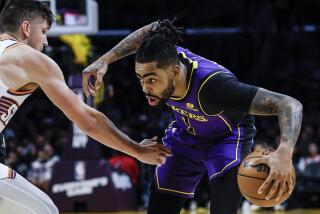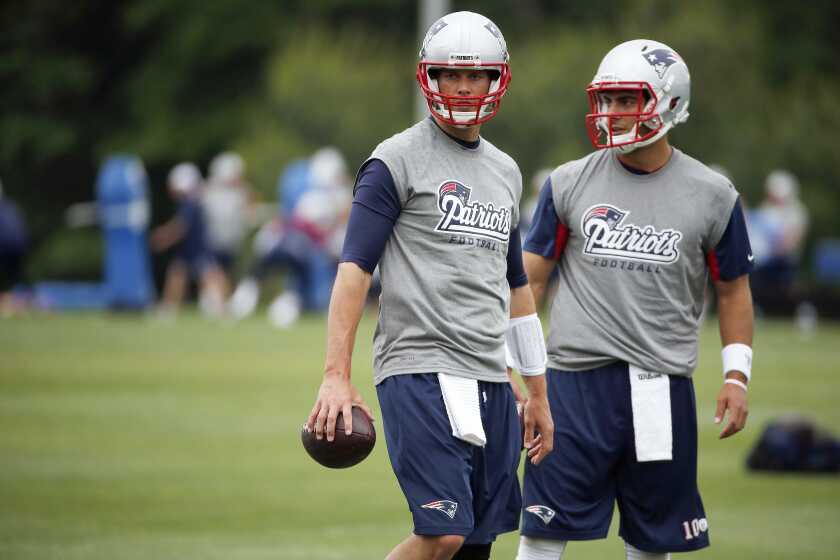Bridge between Russell and USF remains broken
It would be nice after all this time if something could have been worked out to bring Bill Russell back into the fold at the University of San Francisco.
It would be nice if grown men would act like grown men.
But nearly 50 years have passed since the summer of 1957, when the spindly center, who led San Francisco to consecutive NCAA basketball championships in 1955 and 1956, returned to campus to complete work on his degree. He stormed off after being told he’d have to pay his own way because his scholarship had run out.
Relations have been strained ever since between the school and its famous alum, Russell holding a grudge and school administrators throwing their hands up in resignation after later extending an olive branch that fell flat.
“It’s just a shame that we haven’t been close to Bill, or closer to Bill,” says San Francisco Chancellor John L. LoSchiavo, an 82-year-old Jesuit priest who was teaching at the university when the unheralded Russell arrived at the hilltop campus in the spring of 1952. “I guess you can say that both sides are to blame, we for not letting him take those courses that summer when he wanted to finish his degree work.”
And Russell, it was left unsaid, for being so stubborn.
Russell, 73, addressed the situation in his 1966 autobiography, “Go Up for Glory,” writing that he was 16 units shy of a degree when he left school to join the 1956 U.S. Olympic team and, later, the Boston Celtics. “It has not been previously told,” he wrote, “but I did not graduate from the University of San Francisco.”
When he returned to USF in 1957 after leading the Celtics to their first NBA title, Russell noted, he planned to pay his own way “as a gesture of goodwill.”
But, he added, “The gesture was unnecessary. No one offered me the remainder of the scholarship. Dear old USF charged me full retail for my tuition.”
Left unwritten was that Russell, wounded, walked away.
LoSchiavo says that, as far as he knows, the decision to charge Russell was made unilaterally by a former university treasurer, “a cranky old Jesuit priest.”
In 1985, LoSchiavo tried to make amends. As university president, he had reinstated the basketball program after suspending it for three seasons amid allegations of NCAA violations. Russell phoned to offer his help.
At a dinner welcoming back the program, the former star “gave just a terrific talk,” LoSchiavo says. “He talked about the school and he quoted some of his profs, shared some of the things he learned in class, especially philosophy class. He certainly didn’t sound like someone who didn’t enjoy USF. He sounded like someone who fondly remembered his years at USF.”
LoSchiavo, at the suggestion of a colleague, made what he calls “a real, I thought, generous offer” to Russell: If he would give a few talks to different classes and write a paper about his NBA experiences, USF would award him a degree.
Russell said no, LoSchiavo says, and stopped coming around.
Two years ago, when USF celebrated its 150th anniversary, the chancellor says he tried to contact Russell through intermediaries but never heard back.
“Ever since then,” LoSchiavo adds, “a couple guys have said to me, ‘Gee, it’s a shame we can’t bring back Bill Russell. Why don’t we bring back Bill Russell?’ And I said, ‘You know, I’ve washed my hands of it.’ We tried and it just seems like Bill is not interested -- and I don’t see why we should go bowing and scraping anymore.”
Ross Giudice, an assistant to the late USF coach Phil Woolpert, would like for Russell to reconsider his stance, let bygones be bygones and reconnect not only with his alma mater but his former teammates too.
Widely credited with helping to develop the former Oakland McClymonds High benchwarmer into an All-American -- “Much of what I am, I owe to Ross,” Russell wrote in his memoir -- Giudice, 82, remains friendly with the five-time NBA most valuable player, who was the only no-show last year when the ’56 champions gathered for a 50-year reunion.
“I’m going to start working on him about this,” Giudice says, “because he means so much to USF, and I hope USF means a lot to him. I’m sure it does.”
USF was the only school that offered Russell a scholarship, and when he showed up on campus, “he could barely make a layup,” Giudice says. “But you watched him jump and you said, ‘My goodness.’ I always felt, ‘You can’t teach players to jump, but you can teach them everything else,’ so I worked with him quite a bit. By the end of his freshman year, he was probably the best center on the coast.”
By the end of his senior year, Russell and the Dons were two-time NCAA champions and had won 55 consecutive games. With an integrated roster at a time when most college teams were all white -- in the 1955-56 season, five of the Dons’ top eight players were African American -- they also were agents for social change.
Russell then went on to win 11 NBA championships in 13 seasons with the Celtics. In 1966, he was tabbed by Celtics boss Red Auerbach to become the first African American coach of a major U.S. professional team.
An outspoken critic of racial injustice, he has been granted honorary doctorates from a number of colleges, among them Princeton and Georgetown.
But he’s estranged from USF.
And he still hasn’t graduated.
“It’s a shame,” LoSchiavo says.
More to Read
Go beyond the scoreboard
Get the latest on L.A.'s teams in the daily Sports Report newsletter.
You may occasionally receive promotional content from the Los Angeles Times.










